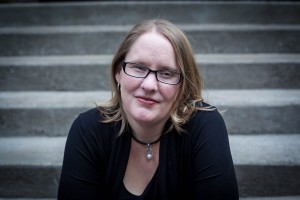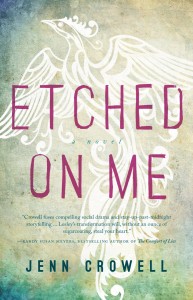Jenn Crowell is another author I’ve come to know through a series of Internet exchanges, mainly via Twitter. I was honored to be asked to “blurb” her new novel ETCHED ON ME, which was published in early February 2014. Here’s what I had to say:
“In ETCHED ON ME’s Lesley Holloway, Jenn Crowell has created a protagonist whom I wish I could meet off the page. Confronted with abuse, stigma, and shame, Lesley takes real risks to do more than survive her circumstances: She changes them. Along the way, Lesley draws strength from a small but hardy cast of supporting characters we’d also all benefit from knowing in everyday life. In the hands of an author lacking Crowell’s skill, the novel might risk falling into stereotype and caricature. But Crowell deftly maintains control–unflinching, authentic, and empathic–throughout. I’m confident that readers will be as impressed with Lesley Holloway (and with Jenn Crowell) as I am.”
My confidence continues as I present this Q&A with Jenn about her new novel.
Jenn Crowell is the critically acclaimed author of the novels NECESSARY MADNESS, LETTING THE BODY LEAD, and, most recently, ETCHED ON ME. She holds an MFA and a Post-Graduate Certificate in the Teaching of Creative Writing from Antioch University Los Angeles, and is a former Berlin Film Festival Talent Campus Fellow in screenwriting. Jenn lives near Portland, Ore., with her husband and young daughter. Please welcome her!

ERIKA DREIFUS (ED): Jenn, you’d published two novels by the time you were 24. Only later did you enroll in an MFA program. Please tell us what inspired you to pursue the MFA and what influence your graduate work at Antioch University-Los Angeles’s low-residency program had on you as a writer.
JENN CROWELL (JC): Many people were surprised that I chose to go back for an MFA after having published multiple novels. My response to them was: “Just because I’m a professional doesn’t mean I don’t have more to learn about the craft of fiction.” Aspiring writers often think that once you’ve “made it” in career terms you magically know everything, but each book presents its own challenges and forces you to utilize new techniques in service to the story.
As for my choice of MFA route, I knew from the get-go that a low-residency format would best suit my circumstances. When I went online and read Antioch’s residency seminar descriptions, and saw lectures on [topics such as] queer writing and bipolar disorder’s impact on the creative process, I just knew that it was my kind of learning environment!
With low-residency programs, you get out of them what you put into them, but the one-on-one interaction with professors is priceless. If you look at the acknowledgments for ETCHED ON ME, you’ll see a long litany of thanks to each person I worked with, along with their individual contributions: nurturing of poetic language, education in the art of the scene jump cut.
My final term there was nothing short of revelatory. I came into it with my novel almost completed, but my mentor Leonard Chang read it and leveled with me: I was hiding from the heart of the story. I sat down the very next day and, for the first time, Lesley’s voice poured out of me.
ED: At last check, your Twitter bio identified you as a “mental health activist and author.” Please tell us a bit about how your activism informs your writing and vice-versa.
JC: Although I had been vision-impaired since birth, had struggled with anxiety and depression, and had been hospitalized for bipolar disorder, I did not focus on disability rights until well into my adult life. When my daughter was a year old, two events catapulted me into mental-health activism.
First, I read a news story about Fran Lyon, a young woman in the UK who was facing the removal of her own daughter at birth due to her previous history of self-harm. I’m a recovered self-harmer, so this shook me to the core, and became the inspiration for writing Lesley’s story.
And then, during one of my terms at Antioch, I relapsed and had to go inpatient for the first time in five years. As if that wasn’t traumatic enough, I was sexually assaulted on the unit where I was staying. When I went to police and eventually entered litigation against the hospital, the response I received was essentially: “So what? You were a psychiatric patient.” They treated me as flawed goods to whom abuse made no difference, so I had to fight to prove I was damaged – ironically, at the same time I was writing about Lesley’s fight to prove she wasn’t.
Ever since we settled out of court, I’ve told that story to anyone who’ll listen. I’ve given lectures at alternative psychiatry symposia. I call out licensed psychologists on their blog posts that dismiss traumatized women as “borderlines.” I raise a lot of hell on Twitter (I was reluctant to rant at first, but every time I do, someone messages me to thank me for speaking out). I think there are tremendous intersections between written witness and active praxis. “Narrative” isn’t just an abstract literary term. It’s the way in which way advocate and present our truths in a culture hell-bent on denying and minimizing them.
ED: I’ll quote some of my own “blurb” for this next question: “In the hands of an author lacking Crowell’s skill, the novel might risk falling into stereotype and caricature. But Crowell deftly maintains control–unflinching, authentic, and empathic–throughout.” The question is this: How anxious were you about that risk of falling into stereotype and caricature (or perhaps even worse, over-sentimentality)? How do you recommend other writers work to avoid similar potential pitfalls in their own work?
JC: I’m so flattered to hear you compliment me on avoiding that pitfall, because I worried about it constantly while writing ETCHED ON ME! I think my saving grace was Lesley’s voice. My initial drafts were written in third-person, and they came perilously close to stereotype due to their distance from her. But as soon as I let her speak in her own naturally snarky, streetwise North London dialect, the book’s potentially overwrought melodrama took on a punchy, poignant brightness. Gallows humor has saved my life on numerous occasions, and Lesley’s use of it allowed me to strike a balance between intense emotion and wry detachment.
I think it’s important to not fear letting your characters emote; I’ll take fierce feeling over chilly irony any day. The key lies in harnessing specificity, in finding that fresh, particular expression which only your narrator would use, to keep your scenes bold rather than belabored.
ED: What was the greatest challenge you encountered in writing ETCHED ON ME?
JC: I suppose a better question might be, “What *wasn’t* a challenge?” This book really pushed me to my outer edges – a brutal but fulfilling stretch. I had to break through so many resistances: to writing Lesley in first person (I honestly thought I couldn’t do it!), to laying bare some explicit but essential material (the sex scenes and labor/birth scene being prime examples), and, most critically, to allowing the most tortuous parts of the plot to unfold.
ED: What is your greatest hope for ETCHED ON ME as it reaches readers?
JC: First, I’d like readers to take delight in my scrappy, irrepressible Lesley – to see her as a charming, capable, and deserving young woman, a human face not just of mental illness and victimization, but also of recovery and resiliency.
Second, I’d like this fictional narrative to connect readers with and raise awareness of discrimination against mothers with mental illness. Fran Lyon’s situation was not an isolated one; a pregnant Italian woman with bipolar disorder recently had her baby taken into foster care after she gave birth while on a business trip to London. And lest anyone think this is a UK-only phenomenon, a study based at the University of Pennsylvania found that parents with mental illness are almost three times more likely to face child protection proceedings than those without. It’s easy to tune out a statistic, even a sobering one, but experiencing a struggle like Fran’s or Lesley’s through an engaging medium like fiction will hopefully give that information heart and nuance.
ED: Anything else you’d like us to know?
JC: Since your readers are also writers, I thought I’d offer a bit of iconoclastic advice that runs counter to the usual obligatory suggestion for budding authors: “Don’t believe in yourself.” Have confidence in your capabilities, sure; have faith that you’ll get that novel finished. But remember: it’s not about you, or your talent. I got plenty of rejections for ETCHED ON ME that complimented my literary skill profusely, but lamented that the book was too dark, too discomfiting, too edgy, too heated. 
And every time I got one, I silently thanked that reader for the compliment and resolved to keep fighting for my dark horse of a book – whether that meant asking my agent to query another editor, or eventually self-publishing if no house made an offer. Whatever it took. That was how unshakeable my belief was: not in Jenn, the former teenage novelist-turned-Twitter-hellraiser, but in Lesley, the 22-year-old pregnant North Londoner whose voice was a privilege and a gift to channel. Crafting and holding space for a narrative enlightens and heals. If you believe in anything, believe in that.
ED: Thank you, Jenn.
Please visit http://www.jenncrowell.com/etched-on-me/ to learn more about Jenn and her book.
(A version of this interview appeared in the March 2014 issue of The Practicing Writer.)